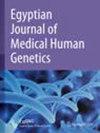四种微 RNA 基因多态性与伊拉克结直肠癌患者有关
IF 1.1
Q4 GENETICS & HEREDITY
引用次数: 0
摘要
结直肠癌(CRC)是全球癌症相关死亡率的主要原因。结直肠癌的发生与遗传变量有关,而遗传变量又具有变异性。这项调查的目的是评估伊拉克人口中 microRNA 基因多态性与结直肠癌(CRC)之间的潜在相关性。研究人员从 100 名被诊断患有(CRC)疾病的患者以及 100 名对照组样本中获取了 DNA 样本。设计了四种引物来扩增 microRNA 分子中的四种特定高频变异。这些变异包括 Mir146a G\C, Mir423 A\C, Mir196a2 和 Mir370。利用单链构象多态性(SSCP)方法对 PCR 片段进行基因分型,然后对每个基因型进行直接测序。基因分型实验证实了 Mir146a G\C 、Mir 423 A\C 、Mir196a2 和 Mir370 这四个目标变异体的变异性往往与癌症(CRC)有显著的关联。Mir146a:GC和Mir 423 A\C 基因型分别显示与(CRC)风险增加可能有关(P = 0.001; OD 0.50; CI 95% 0.33-0.76;P = 0.002; OD 0.53; CI 95% 0.36-0.80)。具有 Mir196a2: TT 和 Mir370 GG 基因型的个体与(CRC)有潜在关联(P = 0.017; OD 0.44; CI 95% 0.22-0.86; P ≤ 0.001; OD 0.24; CI 95% 0.11-0.50)。该研究揭示了微RNA的单核苷酸多态性(SNPs)与结直肠癌(CRC)易感性的升高有着显著而明显的相关性。本文章由计算机程序翻译,如有差异,请以英文原文为准。
Four microRNA gene polymorphisms are associated with Iraqi patients with colorectal cancer
Colorectal cancer (CRC) is a major cause to global cancer-related mortality. The development of colorectal cancer is linked to hereditary variables that exhibit variability. The objective of this investigation was to assess the potential correlation between microRNA gene polymorphisms and colorectal cancer (CRC) throughout the Iraqi population. DNA samples were obtained from a cohort of 100 individuals diagnosed with the (CRC) disease, as well as 100 samples as control group. Four primers were designed to amplify four specific high-frequency variants found within microRNA molecules. These variants include Mir146a G\C, Mir423 A\C, Mir196a2, and Mir370. The genotyping of the PCR fragments was performed using the single-strand conformation polymorphism (SSCP) method, followed by direct sequencing of each genotype. Genotyping experiments confirmed the variability of four targeted variants, namely Mir146a G\C, Mir 423 A\C, Mir196a2, and Mir370 tend to exhibit a significant association with (CRC). Individuals with Mir146a: GC and Mir 423 A\C genotype showed a possible association with the increased risk of (CRC), respectively (P = 0.001; OD 0.50; CI 95% 0.33–0.76; P = 0.002; OD 0.53; CI 95% 0.36–0.80). Individuals with Mir196a2: TT and Mir370 GG genotype exhibited a potential association with (CRC) (P = 0.017; OD 0.44; CI 95% 0.22–0.86; P ≤ 0.001; OD 0.24; CI 95% 0.11–0.50). The study reveals that single nucleotide polymorphisms (SNPs) in microRNA have a notable and distinct correlation with the heightened susceptibility to colorectal cancer (CRC).
求助全文
通过发布文献求助,成功后即可免费获取论文全文。
去求助
来源期刊

Egyptian Journal of Medical Human Genetics
Medicine-Genetics (clinical)
CiteScore
2.20
自引率
7.70%
发文量
150
审稿时长
18 weeks
 求助内容:
求助内容: 应助结果提醒方式:
应助结果提醒方式:


